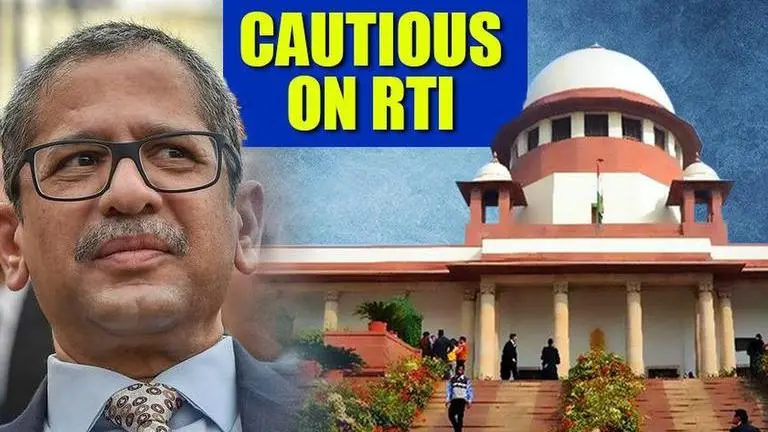Updated 13 November 2019 at 19:38 IST
CJI's office to come under RTI, SC warns 'shouldn't be used as tool for surveillance'
Supreme Court Justice NV Ramana in his separate concurring opinion expressed concern that RTI should not be used as a tool of surveillance against judges.
- India News
- 3 min read

The Supreme Court on Thursday gave a landmark ruling that brings the Office of the Chief Justice of India (CJI) under the ambit of the Right To Information (RTI) Act. Justice NV Ramana in his separate concurring opinion expressed concern that RTI should not be used as a tool of surveillance against judges. Justice Ramana said that the exceptions in Section 8(1)(j) of the Act is to balance the right to privacy with a citizen's right to access information. The said section protects a public servant's right to privacy by stating that there shall be no obligation to give any citizen information which relates to personal information, the disclosure of which has nothing to do with any public activity or interest.
Justice Ramana said, "There needs to be a balance and the whole bulwark of upholding it is on the Judiciary. Judiciary needs to be protected from such a breach." Justice Chandrachud held that “neither is RTI under Article 19 nor is the right to privacy absolute.”
Office of CJI comes under “public authority”
Delivering a landmark judgment on Wednesday, the Supreme Court upheld the Delhi High Court decision bringing the office of the Chief Justice of India (CJI) under the ambit of the Right to Information (RTI) Act. A five-judge Constitution bench headed by Chief Justice Ranjan Gogoi has pronounced the judgment observing that the Office of CJI comes under “public authority”. Other members of the bench are Justices NV Ramana, DY Chandrachud, Deepak Gupta and Sanjiv Khanna.
Advertisement
In a 3:2 split verdict, the SC bench said that as per RTI's provision – the CJI falls under the definition of public authority. The top court added that Public interest demands transparency and that it does not undermine judicial independence. However, the top court said that RTI should not be used as a tool for surveillance. The five-judge bench also said that judicial independence can't be achieved by denying information, adding that independence and accountability go hand in hand. The top court highlighted that judges are not precluded from the rule of law as they hold a constitutional position including the CJI.
Order reserved in April this year
The apex court had on April 4 this year reserved its verdict on the appeals filed in 2010 by the Supreme Court Secretary-General and its central public information officer against the High Court and the Central Information Commission's (CIC's) orders. The bench, headed by the Chief Justice, had wrapped up the hearing, saying nobody wants a "system of opaqueness", but the judiciary cannot be destroyed in the name of transparency.
Advertisement
Published By : Shubhayan Bhattacharya
Published On: 13 November 2019 at 16:37 IST
